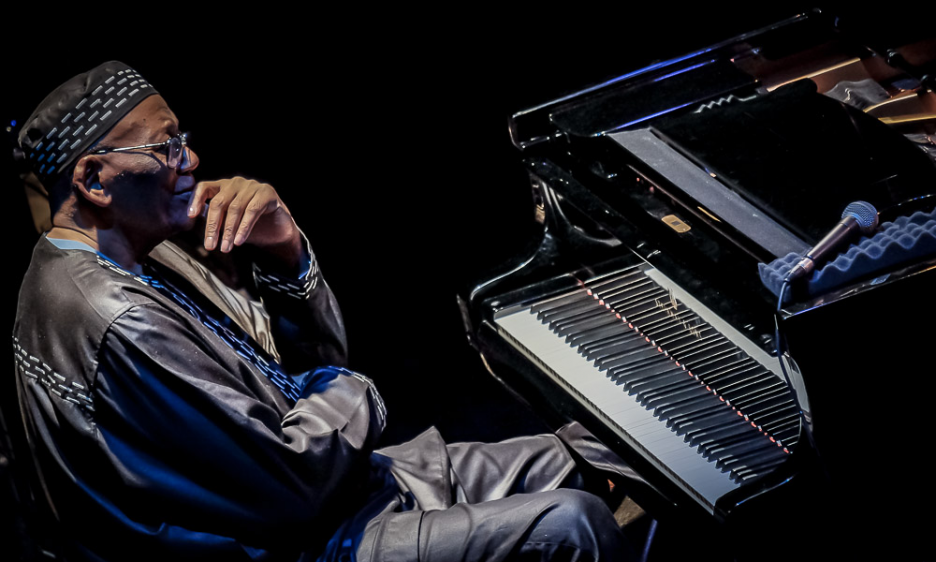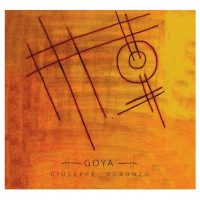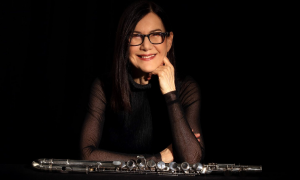Home » Jazz Articles » Interview » Randy Weston: The Spirit of Our Ancestors
Randy Weston: The Spirit of Our Ancestors

African people have always known that you must be in tune with nature. Sometimes we forget that the first music is the music of nature, the sound of the wind, of the ocean, of the birds... So it was nature that gave us the first rules about improvisation.

Thelonious Monk
piano1917 - 1982

Duke Ellington
piano1899 - 1974

Melba Liston
trombone1926 - 1999
Every year, Harvard's Department of Music devotes part of its academic year to the study of great jazz masters. Thanks to this program, musicians such as

Bill Evans
piano1929 - 1980

Gerry Mulligan
saxophone, baritone1927 - 1996

Lester Bowie
trumpet1941 - 1999

Steve Lacy
saxophone, soprano1934 - 2004

Illinois Jacquet
saxophone, tenor1922 - 2004

Lee Konitz
saxophone, alto1927 - 2020

Andrew Hill
piano1931 - 2007

John Lewis
piano1920 - 2001

Carla Bley
piano1938 - 2023

Steve Swallow
bassb.1940

Benny Carter
saxophone, alto1907 - 2003

Clark Terry
trumpet1920 - 2015

Joshua Redman
saxophoneb.1969

Anton Schwartz
saxophone, tenorb.1967
This year, the artist in residence is pianist

Randy Weston
piano1926 - 2018
Randy Weston: You know, music was always there.
AAJ: Do you mean that you grew up in a very music-oriented family?
RW: Not only that, the neighbourhood too... very musical. The whole area was into music... so not only my family, but the next-door family... we'd meet with young guys and we'd speak about music. It was all very natural. I really cannot say what is my first memory of music. It was always there.
AAJ: Do you at least remember what was the first record that you ever bought or that made a great impression on you?
RW: I think it was

Coleman Hawkins
saxophone, tenor1904 - 1969
AAJ: At one point in your career you went to Nigeria and then to Morocco, but you traveled extensively throughout Africa. What was that made you want to know Africa inside out? Were there specific musical reasons that led you there or was it rather the interest in discovering your roots?
RW: I had heard African music when I was still in the States from a great drummer from Guinea. I really wanted to visit that continent but there was no particular African music that led me there.
AAJ: How was your music received by local people and musicians?
RW: I thought it was received quite well. I had already written "Uhuru Africa," I was already using rhythms like 6/8, you know, typical African rhythms. I had always had a love for the drums and in particular for the congas, the African drums. Sometimes I approach the piano as a drum. My first time in Nigeria I had a very good reception. It was an incredible experience.
AAJ: This has made me think about the nature of jazz that transcends national borders and can be appreciated —maybe from different points of view —in different places. Did you feel you were sharing a common ground with the African musicians you played with?
RW: Of course. Music is man's first language. Many people on this planet don't realize that. Music is a universal language, a language we can all understand. When you speak English, or Spanish or Italian or French you can only communicate with the people that know these languages. Sometimes even when you speak the same language you don't understand what people are saying, but with music you can go anywhere in the world and you can communicate. This is why music is called the sacred art. Music is the queen of all arts. This is how I approach music. I always tell people: "this is a language!" Actually it is the most important language. Music has the power to make peace, to heal. I have traveled in Africa, in the Middle East, in Europe, in South America, Asia... lots of places... and music is the language that people know me by and I have made friends that way, all over the world... because of music.
AAJ: Jazz is one of the truly American art forms that has become extremely popular abroad. However over the years many prominent musicians from the U.S. have had to go somewhere else to make a living or to find a recording company. Why was it difficult for them to survive in their own country?
RW: This is because jazz comes out of the African culture. Our ancestors were brought here in slavery. It is hard to accept that the descendents of slaves would create such music. On top of that we are a very small percentage of the population but this music is so strong, so powerful, so true, that it is hard to accept that it could come from people that were brought here in slavery and yet they could create such beauty. This is the reason, no question about it.
Not just us, but also artists like

Duke Ellington
piano1899 - 1974

Coleman Hawkins
saxophone, tenor1904 - 1969

Billie Holiday
vocals1915 - 1959
AAJ: Do you think the situation has changed in the last years?
RW: Not in the media and not in the schools. When we'll see a major TV channel playing a great jazz artist at 8PM on a Saturday night, when we'll see the history of jazz music in the schools, when we'll see a Hollywood movie dedicated to the life of a jazz artist then we'll have a change. But until this happens we are not going to see any difference. We are in a technological society, in which people are influenced by what they see, and we don't see much jazz on TV (or you see it very late at night and often on a small station); we don't see any real jazz in Hollywood movies nor in the schools.
I am sure that at some point this will change. I believe that you can't hide something as beautiful as music.
AAJ: Speaking of jazz popularity, at the beginning jazz was a very popular form of music, it was music people were dancing to. At one point, though, jazz became a very technical music and probably alienated most of its popularity. What do you think is the situation now?
RW: You see, after the start of the second World War, they put a 20% tax on dancing places because of the conditions and necessities of the conflict. For this reason, most of the places where people used to dance closed down and jazz became more of a listening music, rather than a dancing music.
When we grew up we played at a lot of dance clubs; african-american people and all other people, they all love to dance. It was a completely different expressive direction than playing at concerts. You had to make romance on your instrument —this is something that is almost completely forgotten about: these days you listen to lots of music and people are just playing technique... who can play fastest and all that stuff. Before, instead, you had to play romance; you had to play for a woman and move her. In the music of all our ancestors, Duke Ellington,

Louis Armstrong
trumpet and vocals1901 - 1971

Ben Webster
saxophone, tenor1909 - 1973
AAJ: You have mentioned the obsession with technique of many musicians of today. Do you think modern musical education can be considered —at least in part —responsible for this situation?
RW: This is why it is important to bring artists to the schools; this is why it is important to have the history of this music taught in the schools. This is the result of one great advance of technology: today we can buy CDs with the music of the '20s and the '30s. This enables you to study jazz seriously, as an art form. But one should not only study the notes and the technique; it is important to analyze what was the life of the African-American people like at that time; the great segregation, the great racism. This music was for them a form of survival. It was not only music. It was culture. People today don't realize that. They all say, "Oh, I really love jazz!" but they don't know its history. We should realize that this history is the struggle of the people, it is the result of tremendous sacrifice but also of tremendous dignity and pride of people that could produce these big masterpieces and —yet —they could not stay in hotels, they could not ride trains. This is what today is missing: the spirituality of the music, something that you can't get in the conservatories where everything you learn is notes, scales and techniques. When we grew up, instead, music was a very spiritual experience for us. Of course those great masters are not here anymore but we have their recordings and this is why I always encourage young students to do their research. We should all also study African music, because what we are doing today is also the result of what happened before us. It is necessary to see the connections. When that happens musicians have a better sense of direction. They won't forget romance; they won't forget love, family, people.
AAJ: In the younger generation what are the musicians and styles that attract your attention?
RW: There is a great deal of very fine young musicians, but now I am discovering the musicians of the '20s and the '30s which I never really understood up to now, and I am more excited with Duke Ellington or

Art Tatum
piano1909 - 1956
AAJ: Among the great masters of jazz music,

Thelonious Monk
piano1917 - 1982
RW: Monk put the magic back into the music. Monk and Ellington were my favorites. They could capture the serious sound of the piano. Monk was also a tremendous composer. His compositions, his harmonies, his sense of rhythm, his sense of silence are magnificent. Monk had an orchestral conception of the piano. When he played I could see images; he was a great storyteller. He was a real innovator but —at the same time —you could always hear the blues tradition underneath. He was a completely original human being. He was clearly ahead of his time but this is what happens with great artists. However he was lucky to live enough to get to see people appreciate his music. Some artists, unfortunately, are not so lucky. I know how that feels. I cannot compare myself to Monk, but in the '50s when I was doing African music people did not understand what I was doing. Thirty, forty years later things have changed. You have to live long enough to see these things happen.
Monk was also an example for me. I was very impressed by his great dignity. There was a period were he could not work for something like six years, but he kept playing his music... Ellington did the same ... they never compromised. They kept producing their music, beautiful music until they died. Even when he wasn't working, when he had no money to live, Monk never complained, never begged. I really admired him. Any time I was at his house he was always very proper, very elegant, immaculate. The musicians of that period were not only very spiritual in their music, but also in the way they acted and appeared.
The musicians of those days were very open. Monk would show you anything. I could go to Monk's any time and the door was open. The same with

Max Roach
drums1925 - 2007
AAJ: You just said that part of the greatness of artists like Monk or Ellington lies in the fact that they never compromised. They had a way to express themselves, to tell a story, through their instruments and they did not change it. What do you try to tell people through what you play?
RW: I try to celebrate our ancestors. For many people ancestors are not important. They only think about the "now." Maybe they also think about their parents. I try to do just what Ellington was doing: telling stories about our people through music. In the '20s and the '30s all those musicians wrote music about their people: the African-American community, so I never stop to myself but I try to speak about the people before me and around me.
When you go to Africa you realize that —there —musicians are also historians: through the music they play they tell stories about the people. Similarly I do not try to be just a musician, I try to be a story-teller: when people hear me they will think about Duke Ellington, they will remember Monk, they will look for Dizzy, Gillespie,

Count Basie
piano1904 - 1984
AAJ: European classical music has been transmitted in written form because Western European culture has always been transmitted this way. In the African societies, on the contrary, the traditions were passed to the younger generations orally. If this is the case, then, one can always find a little bit of the narrator's personality in the stories that are told. A similar phenomenon can be found in improvised music: you have the standard, the theme of which is always the same, and then the musician can add a little bit of his or her personality interpreting it in a personal way.
RW: That is true, but it is also deeper than that. Music is the voice of Mother Nature, and Mother Nature is always improvising. Today differs from yesterday; tomorrow will not be like today...
AAJ: Let's speak about your collaboration with

Melba Liston
trombone1926 - 1999
RW: She has been able to bring out the best of me. Between us there was magic. It is difficult to explain why and how, it is just like that. Maybe because she is a woman, and woman can be more sensitive, when she would prepare an arrangement of my music, it would sound as if I myself had arranged that tune.
AAJ: Melba Liston has been one among a few female jazz players of her generation. Today the situation is improving but there still is a great imbalance between the number of male and female musicians.
RW: The problem is that women had been excluded for too long from many things. However, if you look at pianists there were many female players. However they would be more likely to play in black churches where the community gathered. Maybe there were not many trombone players like Melba, but women were always there but you usually do not hear about them because they were more community players than stage players.
Photo credit: Roberto Cifarelli
Tags
Comments
PREVIOUS / NEXT
Support All About Jazz
 All About Jazz has been a pillar of jazz since 1995, championing it as an art form and, more importantly, supporting the musicians who make it. Our enduring commitment has made "AAJ" one of the most culturally important websites of its kind, read by hundreds of thousands of fans, musicians and industry figures every month.
All About Jazz has been a pillar of jazz since 1995, championing it as an art form and, more importantly, supporting the musicians who make it. Our enduring commitment has made "AAJ" one of the most culturally important websites of its kind, read by hundreds of thousands of fans, musicians and industry figures every month.





 Buy Now
Buy Now























